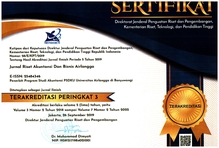Publication Ethics
Publication Ethics and Publication Malpractice Statement
The ethics statements for Jurnal Riset Akuntansi dan Bisnis Airlangga (JRABA) are based on the Committee on Publication Ethics (COPE) Code of Conduct guidelines available at www.publicationethics.org
Editors' Responsibilities
Submitted manuscripts are evaluated for their intellectual content without regard to race, gender, sexual orientation, religious belief, ethnic origin, citizenship, or political philosophy of the authors.
The Editor must not disclose any information about a submitted manuscript to anyone other than the corresponding author, reviewers, potential reviewers, and the publisher, as appropriate.
Unpublished materials disclosed in a submitted manuscript must not be used in an Editor's own research without the explicit written consent of the author(s).
The handling Editor-in-Chief of the journal is responsible for deciding which of the submitted articles should be published. The Editor-in-Chief may be guided by the policies of the journal's Editorial Board and constrained by such legal requirements as shall then be in force regarding libel, copyright infringement and plagiarism. The Editor-in-Chief may confer with other editors or reviewers in making this decision.
Reviewers' Responsibilities
Peer review assists the Editor in making editorial decisions and, through the editorial communication with the author, may also assist the author in improving the manuscript.
Any invited referee who feels unqualified to review the research reported in a manuscript or knows that its timely review will be impossible should immediately notify the Editor so that alternative reviewers can be contacted.
Any manuscripts received for review must be treated as confidential documents. They must not be shown to or discussed with others except if authorized by the Editor.
Reviews should be conducted objectively. Personal criticism of the author is inacceptable. Referees should express their views clearly with appropriate supporting arguments.
Reviewers should identify relevant published work that has not been cited by the authors. Any statement that an observation, derivation, or argument had been previously reported should be accompanied by the relevant citation. A reviewer should also call to the Editor's attention any substantial similarity or overlap between the manuscript under consideration and any other published data of which they have personal knowledge.
Privileged information or ideas obtained through peer review must be kept confidential and not used for personal advantage. Reviewers should not consider evaluating manuscripts in which they have conflicts of interest resulting from competitive, collaborative, or other relationships or connections with any of the authors, companies, or institutions connected to the submission.
Authors' Responsibilities
Authors reporting results of original research should present an accurate account of the work performed as well as an objective discussion of its significance. Underlying data should be represented accurately in the manuscript. A paper should contain sufficient detail and references to permit others to replicate the work. Fraudulent or knowingly inaccurate statements constitute unethical behavior and are unacceptable.
The authors should ensure that they have written entirely original works, and if the authors have used the work and/or words of others that this has been appropriately cited or quoted.
An author should not, in general publish manuscripts describing essentially the same research in more than one journal or primary Parallel submission of the same manuscript to more than one journal constitutes unethical publishing behavior and is unacceptable.
Proper acknowledgment of the work of others must always be given. Authors should also cite publications that have been influential in determining the nature of the reported work.
Authorship should be limited to those who have made a significant contribution to the conception, design, execution, or interpretation of the reported study. All those who have made significant contributions should be listed as co- authors. Where there are others who have participated in certain substantive aspects of the research project, they should be named in an Acknowledgement section.
The corresponding author should ensure that all appropriate co-authors (according to the above definition) and no inappropriate co-authors are included in the author list of the manuscript and that all co-authors have seen and approved the final version of the paper and have agreed to its submission for
All authors should disclose in their manuscript any financial or other substantive conflicts of interest that might be construed to influence the results or their interpretation in the manuscript. All sources of financial support for the project should be disclosed.
When an author discovers a significant error or inaccuracy in his/her own published work, it is the author's obligation to promptly notify the journal's Editor or publisher and cooperate with them to either retract the paper or to publish an appropriate erratum.
Publisher's Responsibilities
In cases of alleged or proven scientific misconduct, fraudulent publication or plagiarism the publisher, in close collaboration with the Editors, will take all appropriate measures to clarify the situation and to amend the article in question. This includes the prompt publication of an erratum or, in the most severe cases, the complete retraction of the affected work.
The Publisher and the Journal do not discriminate on the basis of age, color, religion, creed, disability, marital status, veteran status, national origin, race, gender, genetic predisposition or carrier status, or sexual orientation in its publishing programs, services and activities.
AI Disclosure Statement for the Journal of Aquaculture Science (JoAS)
The Jurnal Riset Akuntansi dan Bisnis Airlangga (JRABA) recognizes the growing role and potential of artificial intelligence (AI) technologies in supporting research and scholarly communication. JRABA welcomes the responsible use of AI tools to assist authors, reviewers, and editors in various aspects of the research and publication process — including idea generation, data synthesis, analysis, language improvement, and manuscript organization.
While large language models (LLMs) and other generative AI tools can accelerate research discovery and enhance the quality of academic writing, they cannot replace human creativity, critical thinking, and scientific judgment. JoAS’s policy on the use of AI aims to guide all contributors in applying these technologies ethically and transparently, ensuring that the integrity, originality, and accountability of scholarly work are fully maintained.
For Authors
The authors recognize the potential of artificial intelligence (AI) tools to support research and manuscript preparation when used responsibly and with appropriate human oversight. AI tools may be used to assist in tasks such as improving language clarity, summarizing literature, organizing content, or supporting other technical aspects of manuscript preparation. However, these tools must not replace human critical thinking, interpretation, or authorship.
In preparing this manuscript, the authors confirm that any use of AI tools (for example, ChatGPT by OpenAI) was conducted responsibly and solely to assist with [state the purpose, e.g., language editing or literature summarization]. All AI-generated material was carefully reviewed, edited, and verified by the authors to ensure accuracy, originality, and alignment with the scientific and ethical standards of the Journal of Aquaculture Science. The final content reflects the authors’ own analysis, interpretation, and conclusions.
No AI tool or software was credited as an author or co-author of this work, as authorship implies human accountability and intellectual contribution. The authors take full responsibility for the integrity and validity of all aspects of the manuscript.
If AI tools were used within the research workflow (such as data analysis, code generation, or image creation), these uses have been described transparently in the Methods section, including the name and function of the tool.
If no AI tools were used in any stage of the manuscript preparation or research, the authors should instead include the following statement:
“The authors declare that no artificial intelligence (AI) tools were used in the writing, analysis, or preparation of this manuscript.”
For Reviewers
Manuscripts assigned for peer review must be treated as strictly confidential documents. Reviewers must not upload, share, or submit any part of a manuscript—or their review report—to generative artificial intelligence (AI) tools, as doing so may compromise author confidentiality, proprietary data, or copyright.
Reviewers are fully responsible for the accuracy, fairness, and integrity of their review reports. Generative AI tools such as ChatGPT or similar systems must not be used to generate, summarize, or evaluate the scientific content of a manuscript, as these tasks require human judgment, expertise, and critical evaluation.
Reviewers may use AI-assisted tools only for minor language refinement of their own review text, provided that no confidential manuscript content is entered into the tool and the reviewer maintains full responsibility for the content of their report.
Any reviewer who suspects inappropriate or undisclosed use of AI tools by authors or other reviewers should notify the handling editor immediately.
For Editors
Editors must maintain strict confidentiality regarding all submitted manuscripts and associated correspondence. No part of a manuscript, author communication, or editorial decision letter may be uploaded into a generative AI tool for analysis, language improvement, or decision drafting, as this may violate author confidentiality, copyright, or data privacy.
Editors are solely responsible and accountable for editorial decisions and the integrity of the peer review process. Generative AI tools must not be used to evaluate the scientific quality, originality, or suitability of manuscripts for publication.
Editors may, however, use trusted AI-assisted systems approved by the publisher to support administrative tasks—such as identifying potential reviewers or screening for plagiarism—provided that such tools comply with data privacy and ethical standards.
If an editor suspects that a manuscript, review, or decision letter has been generated inappropriately using AI tools, the matter should be referred to the editorial office or publisher for investigation in accordance with COPE guidelines.

























